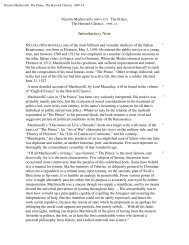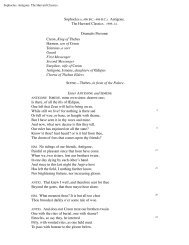Notre Dame de Paris - Bartleby.com
Notre Dame de Paris - Bartleby.com
Notre Dame de Paris - Bartleby.com
You also want an ePaper? Increase the reach of your titles
YUMPU automatically turns print PDFs into web optimized ePapers that Google loves.
fact. However, tranquillity had gradually been restored, Jehan was silent, the beggar was counting the<br />
small change in his hat, and the play had once more got the upper hand.<br />
Sooth to say, it was a very fine work which, it seems to us, might well be turned to account even now<br />
with a few modifications. The exposition, perhaps somewhat lengthy and dry, but strictly according to<br />
prescribed rules, was simple, and Gringoire, in the inner sanctuary of his judgment, frankly admired its<br />
perspicuity.<br />
As one might very well suppose, the four allegorical personages were somewhat fatigued after having<br />
travelled over three parts of the globe without finding an opportunity of disposing suitably of their gol<strong>de</strong>n<br />
dolphin. Thereupon, a long eulogy on the marvellous fish, with a thousand <strong>de</strong>licate allusions to the young<br />
betrothed of Marguerite of Flan<strong>de</strong>rs—who at that moment was languishing in dismal seclusion at<br />
Amboise, entirely unaware that Labour and Clergy, Nobility and Commerce, had just ma<strong>de</strong> the tour of<br />
the world on his behalf. The said dolphin, then, was handsome, was young, was brave; above all<br />
(splendid origin of all the royal virtues) he was the son of the Lion of France. Now I maintain that this<br />
bold metaphor is admirable, and the natural history of the stage has no occasion on a day of allegory and<br />
royal epithalamium to take exception at a dolphin who is son to a lion. These rare and Pindaric<br />
<strong>com</strong>binations merely prove the poet’s enthusiasm. Nevertheless, in justice to fair criticism be it said, the<br />
poet might have <strong>de</strong>veloped this beautiful i<strong>de</strong>a in less than two hundred lines. On the other hand, by the<br />
arrangements of Monsieur the Provost, the Mystery was to last from noon till four o’clock, and they were<br />
obliged to say something. Besi<strong>de</strong>s, the people listened very patiently.<br />
Sud<strong>de</strong>nly, in the very middle of a quarrel between <strong>Dame</strong> Commerce and my Lady Nobility, and just as<br />
Labour was pronouncing this won<strong>de</strong>rful line:<br />
“Beast more triumphant ne’er in woods I’ve seen,”<br />
the door of the reserved platform which up till then had remained inopportunely closed, now opened still<br />
more inopportunely, and the stentorian voice of the usher announced “His Eminence Monseigneur the<br />
Cardinal <strong>de</strong> Bourbon!”<br />
III. The Cardinal<br />
ALAS, poor Gringoire! The noise of the double petards let off on Saint-John’s Day, a salvo of twenty<br />
arque-buses, the thun<strong>de</strong>r of the famous culverin of the Tour <strong>de</strong> Billy, which on September 29, 1465,<br />
during the siege of <strong>Paris</strong>, killed seven Burgundians at a blow, the explosion of the whole stock of<br />
gunpow<strong>de</strong>r stored at the Temple Gate would have assailed his ears less ru<strong>de</strong>ly at this solemn and<br />
dramatic moment than those few words from the lips of the usher: “His Eminence the Cardinal <strong>de</strong><br />
Bourbon!”<br />
Not that Pierre Gringoire either feared the Cardinal or <strong>de</strong>spised him; he was neither so weak nor so<br />
presumptuous. A true eclectic, as nowadays he would be called, Gringoire was of those firm and elevated<br />
spirits, mo<strong>de</strong>rate and calm, who ever maintain an even balance—stare in dimidio rerum—and who are<br />
full of sense and liberal philosophy, to whom Wisdom, like another Ariadne, seems to have given a ball<br />
of thread which they have gone on unwinding since the beginning of all things through the labyrinthine<br />
paths of human affairs. One <strong>com</strong>es upon them in all ages and ever the same; that is to say, ever<br />
conforming to the times. And without counting our Pierre Gringoire, who would represent them in the<br />
fifteenth century if we could succeed in conferring on him the distinction he merits, it was certainly their<br />
spirit which inspired Father <strong>de</strong> Bruel in the sixteenth century, when he wrote the following sublimely










